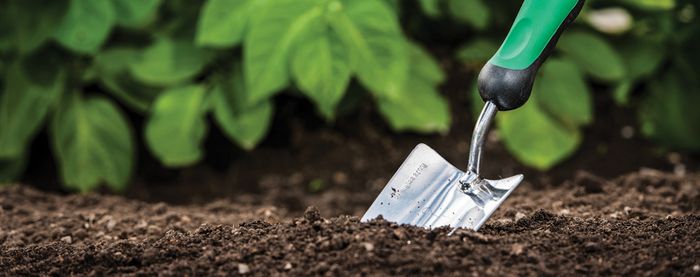5 Spring Beauties to Start the Gardening Season Off Right
These great spring plants make attractive anchors for great garden displays

I am addicted to acquiring new plants, perhaps more than most people. If you tell me all the glorious details of a recent introduction, I will buy it by the dozen. Oh, it’s fussy and demanding? That’s OK. I want it, and I want it now.
But sometimes what you want isn’t what you need. Often what you really need is a plant that you can build a garden bed around. It should be tough, undemanding, able to handle some stress, and visually appealing for multiple seasons. After more than 25 years working in a public garden, I have discovered some great plants that don’t let me down. Here are a few that make attractive anchors for great displays.

‘Mango Magic’ hellebore
Name: Helleborus ‘Mango Magic’
Zones: 3–9
Size: 18 inches tall and wide
Conditions: Full to partial shade; average to moist, well-drained soil
Native range: Hybrid
With so many glorious hybrids available, it is difficult to find a bad hellebore (Helleborus spp. and cvs., Zones 4–9). It is really a matter of finding the flower color you like, and ’Mango Magic’ does the trick for me. Magical yellow blooms with red streaking emerge in late winter or early spring, and they last for weeks. The foliage is truly evergreen, providing four seasons of interest, and it is deer resistant too. If the foliage starts to look rough by late winter, you can cut it off as soon as the flower buds appear. ‘Mango Magic’, like other hellebores, is a shade plant that does best in fertile soil with adequate moisture.

‘Silver Heart’ brunnera
Name: Brunnera macrophylla ‘Silver Heart’
Zones: 3–8
Size: 12 inches tall and 18 inches wide
Conditions: Partial shade; average to moist, well-drained soil
Native range: Eastern Europe to Western Asia
Brunneras (Brunnera macrophylla and cvs., Zones 3–8) are also excellent shade plants, even tolerating dry shade once established. The heavy silvering of ‘Silver Heart’ brings it to a whole new level. It is sturdy and beautiful, with thick leaves that help it handle heat and humidity, so it stays sharp all summer. It also has excellent winter hardiness. This plant tolerates various soil conditions but does best in average or better soil with decent moisture. Blue spring flowers add another great dimension.

Bunny Blue® creeping sedge
Name: Carex laxiculmis ‘Hobb’
Zones: 5–9
Size: 8 to 12 inches tall and wide
Conditions: Full to partial shade
Native range: Eastern North America
There are few true grasses that do well in shade, so we often turn to sedges (Carex spp. and cvs., Zones 3–10) instead to provide fine texture. With its neat mounds of silvery blue leaves, Bunny Blue® creeping sedge is especially good for lighting up a shady spot. Mine is surviving in less-than-ideal soil that can get extremely dry. If you are kind enough to place it in light shade with good soil that holds a bit of moisture, it would be most appreciative.

‘Lemon Meringue’ baptisia
Name: Baptisia ‘Lemon Meringue’
Zones: 4–9
Size: 3 feet tall and wide
Conditions: Full sun to partial shade; average to dry, well-drained soil
Native range: Hybrid of species found in Texas and Oklahoma
‘Lemon Meringue’ baptisia is an outstanding hybrid that is covered in late spring by bright lemon yellow flowers held well above the foliage. After flowering, the deep blue-green foliage acts as a shrub in the landscape. Baptisias can tolerate a little shade, but they bloom best in full sun. Once established, they are not fussy about soil and will even tolerate dry periods.

‘Bevan’s Variety’ bigroot geranium
Name: Geranium macrorrhizum ‘Bevan’s Variety’
Zones: 4–8
Size: 8 to 12 inches tall and 18 to 24 inches wide
Conditions: Full sun to partial shade; dry to moderately moist, well-drained soil
Native range: Southern Europe and Turkey
Several geraniums have a long bloom time, but few are as versatile as ’Bevan’s Variety’ bigroot geranium. It is vigorous enough to be used as a ground cover in full sun or partial shade, and while it is happiest in good soil, it can handle less-ideal soil as well. Once established, it will tolerate dry conditions for short periods. Its late spring to early summer flowers need no deadheading, and the attractive light green foliage looks good all season.

Planting plan
Cool hues shine in shade
Color echoes are pleasing to the eye and help tie a bed together. To brighten up a shady spot, try building a plant combination around soothing blues with silver echoes.
1. Bunny Blue® creeping sedge
2. ‘Silver Heart’ brunnera
3. A medium-size blue hosta such as ‘Halcyon’ (Hosta ‘Halcyon’, Zones 3–8)
4. Japanese painted fern (Athyrium nipponicum var. pictum and cvs., Zones 5–8)
5. ‘Blue Mist’ dwarf fothergilla (Fothergilla gardenii ‘Blue Mist’, Zones 5–8)
6. ‘Misty Blue’ white baneberry (Actaea pachypoda ‘Misty Blue’, Zones 4–8)
Irvin Etienne is the curator of herbaceous plants and seasonal garden design for the Garden at Newfields in Indianapolis.
Sources
- Bluestone Perennials, Madison, OH; 800-852-5243; bluestoneperennials.com
- Perennial Farm Marketplace, Glen Arm, MD; 410-592-6106; perennialfarmmarketplace.com
- Rare Roots, Mechanicsville, VA; 804-296-6592; rareroots.com
- White Flower Farm, Litchfield, CT; 800-503-9624; whiteflowerfarm.com





Comments
Log in or create an account to post a comment.
Sign up Log in